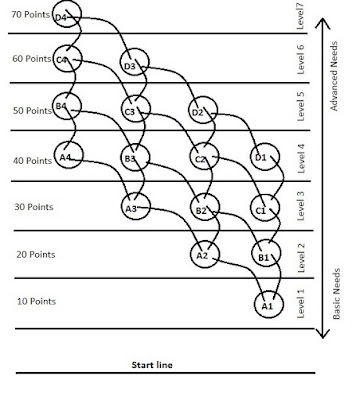Need-Emotion – A Complex system
Need-Emotion
– A Complex system
The
below article is an extract from my book ‘being Emotionally street-smart’. It
gets a little technical and would need background in theoretical understanding
of Maslow’s hierarchy of needs.
Emotions
Out of all the experiences we carry, our journey
with Emotions is the oldest. Emotions have been with us since birth and we all
have our understanding and Individual theory about what they are, how they
work, how to make the best of them, etc. The simple way Emotions can be defined
is representation of satisfied or
unsatisfied Needs (Maslow chacha ki theory for Needs). When you Desire something and
achieve more than expected, you experience positive Emotions like joy,
happiness, delight, etc. and in the event of not achieving what is Desired, you
experience negative Emotions like sadness, anger, frustration, etc.
Does this also mean that people, who constantly
achieve exactly what they predicted, do not feel extreme Emotions? Yes it does.
Emotions are Metric System to determine
how realistic Individual theory is. Predicting an outcome is driven by your
Know-How of the world. How accurately you understand all the forces at work,
parameters involved in influencing an act, etc. More realistic your Individual
theory is, better is your prediction of outcome. Think of instances when you
had put in lot of efforts and were really really really hopeful that things
turn out the way you want. You did not have clarity in predicting the outcome
accurately, but when it happened the way you hoped for, you were not only
extremely happy, but you also added learning from your experience and improved
your Know-How about how things work making it more realistic. On the contrary,
you did not feel any extreme Emotion when you took the same train which you do
daily. The outcome of your efforts was predictable with high accuracy, hence,
no extreme Emotion.
Risk taking appetite – The Emotional impact
Risk taking is an integral part of Human Decision
Making process and Emotions play a large role in it. Any Rational human being takes Risk when he has enough to afford losing
a little. Risk is usually taken to achieve Desire at upper level and in the
event of not achieving it, the least what a person gains is better Know-How,
better understanding of how things work. So there’s no real loss, it is just an
estimate of the investment being worth it.
While referring to Emotional Impact we have learnt
earlier in this text that often investment in terms of efforts (in terms of
time, energy, money, space of mind, etc.) is needed while attempting to
establish a new relationship or achieving Desire of higher level. Such
investments are easily welcome when the person is either high on positive
Emotions (remember making large promises when you were very happy?) or has
robust mechanism (highly practical Individual theory) of achieving what is
Desired (with highly realistic Know-How). People
who are Emotionally resilient (capable of recovering fast from loss) have higher appetite for Risk taking.
Ever growing Needs and role of Emotions – a complex system
Referring to discussed concept in the text
earlier, Needs follow complex hierarchy, they don’t just move from basic to
advanced, they also move up in their levels in each Need. To facilitate
understanding of the same, below is a game with similar rules:
Similar to any game, this game has an Aim and few
Rules.
Aim: To achieve as many points as possible
Rules: You need to stand near the start line and
throw marbles in the hole with the following rules:
1.
You need to
decide which hole to aim at before throwing the marble
2.
If the marble
goes inside the hole, you get points mentioned in that level and if you miss
you lose the same amount of points from your total score.
3.
All the holes
will be closed at the beginning except A1.
4.
Other holes will
open when you master your skills of putting marbles into A1, atleast 5 marbles.
5.
On successfully
putting 5 marbles in A1, two holes would open; B1 and A2.
6.
The same rule of
mastering skills at a hole with 5 marbles applies to all holes before they are
opened.
7.
For holes like
B2, they will open only when both the holes below A2 and B1 are mastered by
putting 5 marbles in each.
8.
The game gets
more complex at higher levels as the required no. of holes to be mastered are
more and the risk is also higher. For example to open D3 one has to master all
11 holes below and even after it opens the risk is very high. Missing an
attempt of putting a marble in it would cost 60 points, equivalent to 6
successful point gains at A1.
When one tries to gain more and more positive
points, it is essential to meticulously balance between risk and skills. The
same is the case with Human Decision Making, to carefully balance.
Here each hole refers to Needs, on achieving a
Need positive Emotions (positive points) are gained and on not achieving
negative Emotions are experienced (losing points in game). The only way to win
this game is by using a plan and process that works (realistic Individual
theory). Losing points (experiencing negative Emotions) doesn’t stop the game,
one has to accept the loss and give time to understand what would be a more
practical approach (managing Emotions) and use the revised approach to give it
another shot and gain more points (improve Know-How and Individual theory
making it more practical).
A small note here to identify different levels of
same Need. Looking at our experiences and talking about simple Need of hunger,
it grows from any food to specific taste to specific ingredients to specific
method of growing/raising ingredients and so on and on and on. Below is a small
exercise to identify your personal levels of same Need:
Need
|
Level 1
|
Level 2
|
Level 3
|
Hunger
|
|||
Security
|
|||
Self-Respect
|
|||
Respect from others
|
Warm Personal
Regards,
Deep Mody
A Change
Leader!
Helping
Humans do what they do the best - Be Human



Comments
Post a Comment